Books on Xi's shelf
The list covers history and the future, China and the world, technology and philosophy
Your host thought it might be interesting to look at Xi’s bookshelf, which was in the background of his New Year speech on Dec. 31.
There are plenty of sources that took a look at the pictures shown on his bookshelf, so to supplement them, this newsletter will focus on what’s behind the pictures, the books.
Below is a list of all the books your host was able to make out from open-source photos. Unfortunately, some of the books are blocked by the frames, so it’s worth noting that this will be an INCOMPLETE list of the books.
There are four bookshelf panels shown in the video, for clarity the list will follow the order of left to right, top to bottom.
Photo 1
【1】 《莎士比亚全集》The Full Works of Shakespeare
Publisher: Yilin Press
Xi has made numerous references to Shakespeare in his past speeches. He described his early encounter with Shakespeare in a 2015 speech in London.
I went to Northern Shaanxi from Beijing before I turned 16 to be a farmer, and spent 7 years of my youth there. During that time, I looked hard for works of Shakespeare.
我不到16岁就从北京来到了中国陕北的一个小村子当农民,在那里度过了7年青春时光。那个年代,我想方设法寻找莎士比亚的作品。”
In 2009, while attending the Frankfurt book fair with the German
Chancellor Angela Merkel as the Chinese vice president, Xi noted that thanks to the exchanges among various cultures, people from different countries could get to know Goethe, Shakespeare, and Confucius.
In 2015, while addressing the UK parliament as the Chinese president, Xi borrowed a quote from Shakespeare in his speech, saying "What's past is prologue", and that it is hoped that the Parliament members will continuously serve as active promoters of bilateral relations, contributors of bilateral friendship and supporters of bilateral cooperation from a long-term perspective, and pave a way of understanding and cooperation for brighter future of bilateral relations.
On that same trip, the late Queen Elizabeth II gifted Xi with a collection of Shakespeare sonnets upon learning that Xi is a fan of the bard.
【2】 《唐宋词鉴赏辞典》 Appraisal Dictionary of Ci of the Tang and Song Dynasties
Press: Shanghai Lexicographical Publishing House
Ci is a traditional Chinese literary form like a poem but with verses of differing lengths. This literary form emerged in the Tang Dynasty and peaked in the Song.
【3】 《左传》 Chronicle of Zuo
Press: Zhonghua Book Company
The Chronicle of Zuo is a narrative history covering Chinese history from 722 B.C to 468 B.C. It’s considered a faithful record of history one of the most important classics of Chinese history.
In a speech at UNESCO headquarters in 2014, Xi made a reference to the work as he explained the traditional Chinese view on harmony and diversity.
The Chinese have long come to appreciate the wisdom of "harmony without uniformity". Zuo Qiuming, a Chinese historian who lived 2,500 years ago, recorded in the Chronicle of Zuo the following comments by Yan Ying, Prime Minister of the State of Qi during the Spring and Autumn Period: "Achieving harmony is like preparing the thick soup. Only with the right amount of water, fire, vinegar, meat sauce, salt and plum can fish and meat be cooked with the right taste." "It is the same when it comes to music. Only by combining the sounds of different instruments with the right rhythm and pitch as well as tone and style can you produce an excellent melody." "Who can eat the soup with nothing but water in it? What ear can tolerate the same tone repeatedly played on one instrument?"
中国人早就懂得了“和而不同”的道理。生活在2500年前的中国史学家左丘明在《左传》中记录了齐国上大夫晏子关于“和”的一段话:“和如羹焉,水、火、醯、醢、盐、梅,以烹鱼肉。”“声亦如味,一气,二体,三类,四物,五声,六律,七音,八风,九歌,以相成也。”“若以水济水,谁能食之?若琴瑟之专壹,谁能听之?”
Photo 2
【4】 《中国通史》 History of China
Press: People’s Press
The History of China is partially authored by Chinese History giant Fan Wenlan. Impressed by Fan’s work, Mao Zedong told Fan in 1968 that China needs a history book and asked Fan to start working on such a book using his views and approach.
In 2016, the History of China was among the top 10 best-selling kindle e-books on Amazon China.
【5】 《全唐诗》 Full Collection of Tang Poems
Press: Zhonghua Book Company
Poems of the Tang Dynasty are considered a pinnacle of classic Chinese literature. Loved by all Chinese, many Tang verses have entered the Chinese lexicon and are frequently used in everyday conversation. The Tang poems are not only a favorite of the Chinese but have found many fans in Korea and Japan, as well as around the world.
The Full Collection of the Tang Poems was first commissioned by the Emperor Kangxi of the Qing Dynasty, and its first edition collected nearly 50 thousand poems from more than 2,200 poets. The latest edition added more than 4,600 poems and more than 800 poets to the collection.
Xi has on many occasions quoted poem verses. Here your host would raise two anecdotes from when Xi was dealing with foreign dignitaries.
In 2013, when then-South Korean President Park Geun-hye came to China for a visit, she was given a calligraphic work bearing a Tang dynasty poem, At Heron Lodge, containing the sentence
欲穷千里目, 更上一层楼。
Ascend another storey to see a thousand miles
Which embodied the wish for China-ROK ties to reach new heights and achieve greater potential.
Arabella Rose, the granddaughter of former U.S. President Donald Trump, started learning Chinese since 18 months old. She got to show off her Chinese skills in person and online during the two meetings between his grandfather and Xi.
In a video shown when Trump visited Beijing in 2017, Arabella Rose proudly recited two well-known Tang poems, Gazing at a Waterfall on Mount Lu and Departing from Baidi in the Morning
日照香炉生紫烟,
遥看瀑布挂前川。
飞流直下三千尺,
疑是银河落九天。
Sunlight illuminates Incense Burner Peak, kindling violet smoke;
from afar, a waterfall hangs before the river.
Water flies straight down three thousand feet—
Has the silver stream of our galaxy plunged from the highest heaven?
朝辞白帝彩云间,
千里江陵一日还。
两岸猿声啼不住,
轻舟已过万重山。
This morning, I depart the town of Baidi, engulfed by vibrant clouds.
I return to far away Jiangling within a single day!
From both banks, the steady sound of shrieking monkeys fills the air.
Our little boat has already carried me past thousands of hilltops.
Photo 3
【6】 《孙中山全集》 The Complete Works of Sun Yat-sen (link is for an earlier edition with a different cover)
Press: Zhonghua Book Company
It’s hard to overstate the influence Dr. Sun Yat-sen has on modern China. According to one count, there are over 770 administrative zones in China that is named after Sun, Zhongshan city of Guangdong province, where Sun is born, is the only Chinese city that’s named after a person. In addition, there are more than 640 roads in China that are also named after Sun. If you count all of the Sun Yat-sen-related places in overseas Chinese communities, the tally will grow considerably, as Sun enjoys the universal respect of all Chinese descendants.
In October 2021, China held a commemorative meeting marking the 110th anniversary of the Revolution of 1911. At the meeting, Xi said
Dr. Sun Yat-sen was a great national hero, a great patriot, and a great pioneer of China's democratic revolution. He called out to "save our people from misery and prop up our tottering country without delay." He held high the banner of struggle against feudal autocracy and put forward the political program based on the Three People's Principles of nationalism, democracy, and people's livelihood. They spread revolutionary ideas far and wide, unleashed the tide of progress, and launched a series of armed uprisings, generating an unstoppable wave of revolution.
【7】 《李大钊全集》The Complete Works of Li Dazhao
Press: People’s Press
Li Dazhao was one of the early founders of the Communist Party of China. In 2009, Xi delivered a speech at the meeting commemorating 120 years since Li’s birth. In 2019, Wang Huning, a PBSC member, delivered a speech at the meeting commemorating 130 years since Li’s birth.
Photo 4
【8】《中国文学鉴赏辞典大系》Collection of Appraisal Dictionaries of Chinese Literature
Press: Shanghai Lexicographical Publishing House
This collection of dictionaries is the best tool book to help understand Poems of the Tang Dynasty, the Ci of the Song Dynasty, the Opera of the Yuan Dynasty, and essays throughout the ages.
【9】《汉语大词典》The Great Chinese Dictionary
Press: Shanghai Lexicographical Publishing House
Boasting 23 volumes and more than 405 thousand entries, the Great Chinese Dictionary is perhaps one of the most comprehensive dictionaries of the Chinese language.
Photo 5
【10】 《新编剑桥世界近代史》The New Cambridge Modern History
Press: China Social Sciences Press
This is the Chinese translation of the renowned set of books first published by Cambridge University Press. It covers world history between the Renaissance in 1493 and the end of World War II in 1945.
Photo 6
【11】《世界文明史》The Story of Civilization
Press: Tiandi Press
This is the Chinese translation of the work by U.S. historians Will and Ariel Durant.
The two books in this photo are the Age of Faith and the Age of Napoleon respectively.
The Lessons of History, another book by the Durants, was listed as recommended reading by the Central Commission for Discipline Inspection in 2015.
【12】《西方通史》Geschichte des Westens
Press: Social Sciences Literature Press/Thorn Bird
This is the Chinese translation of the German history book by Heinrich August Winkler.
【13】《全球通史》 A Global History: From Prehistory to the 21st Century
Press: Peking University Press
This two-parter is a Chinese translation of the work by U.S. historian L.S. Stavrianos.
Photo 7
【14】《跟大师学国学》Collection: Chinese Culture by Masters
Press: Zhonghua Book Company
This is a collection of 40 books on various traditional cultural topics by acclaimed Chinese scholars.
【15】《伟大的海》The Great Sea: A human history of the Mediterranean
Press: Social Sciences Literature Press
This is the Chinese translation of the work by Cambridge University professor David Abulafia. The book is considered one of the best history books on the Mediterranean Sea region, covering a time span from 3500 B.C. to contemporary times.
【16】《西方哲学史》A History of Western Philosophy
Press: Commercial Press
This two-parter is the Chinese translation of the 1946 book by British Philosopher Bertrand Russell.
During a speech made in October 2015 at a Dinner Hosted by The Lord Mayor of the City of London, Xi quoted Russell as saying,
The Chinese people "understand their own country", and only "a solution slowly reached by themselves may be stable".
【17】《耶鲁古文明发现史》A Little History of Archaeology
Press: People's Daily Publishing House
This is the Chinese translation of the work by British scholar Brian Fagan. Xi has been a long-time friend of archaeology. Here is a Xinhua profile story that documents Xi’s fondness for the discipline.
Photo 8
【18】《复兴文库》A Collection of books on Rejuvenation
Press: Zhonghua Book Company
This book series collects important documents that chronicle the history of China from 1840 onward. It presents thoughts that spurred the development, progress and rejuvenation of the Chinese nation.
Photo 9
【19】《科学的历程》The Journey of Science
Press: Hunan Science Technology Publishing House
A popular book by Tsinghua University Professor Wu Guosheng on the history of scientific development of mankind.
【20】《趋势2030》2030: How Today's Biggest Trends Will Collide and Reshape the Future of Everything
Press: CITIC Press Group
This is the Chinese translation of the work of U.S. sociologist Mauro F. Guillén, which offers insights into where we are heading and why these changes matter.
【21】《深度学习》The Deep Learning Revolution
Press: CITIC Press Group
This is the Chinese translation of the work of Terry Sejnowski. It explains how deep learning—from Google Translate to driverless cars to personal cognitive assistants—is changing our lives and transforming every sector of the economy.
【22】《超级技术》 Megatech: Technology in 2050
Press: CITIC Press Group
This is the Chinese translation of the book edited by Daniel Franklin. Where will technology take us by 2050? How will it affect the way we live? And how far are we willing to let it go? In this book, scientists, industry leaders, academics and science-fiction writers join journalists to explore answers to these questions.
【23】《九大思考》Unsere Welt neu denken: Eine Einladung
Press: China Translation & Publishing House
This is the Chinese translation of the work by German political economist Maja Göpel. In this book, the author warns we do not solely face an environmental crisis but also a social one.
【24】《地球的故事》 The Story of Earth: The First 4.5 Billion years, From Stardust to Living Planet
Press: CITIC Press Group
This is the Chinese translation of the book by Robert Hazen. Science Magazine says the book is "a sweeping rip-roaring yarn of immense scope, from the birth of the elements in the stars to meditations on the future habitability of our world."
Photo 10
【25】《习仲勋画传》An Illustrated Biography of Xi Zhongxun
Press: Xue Xi Publishing House
【26】《走向人类文明新形态》Toward a New Model For Human Advancement
Press: Tianjin People’s Press
The New Model for Human Advancement is a new concept first introduced by Xi at the celebration marking the 100th anniversary of the founding of the CPC. Definitely worth reading up on.
【27】《中国经济这十年》The Chinese Economy of a Decade (2012-2022)
Press: Economy Science Publishing House
The book incorporates statistics and case studies to illustrate the achievements of the Chinese economy from 2012 to 2022.
【28】《自我革命:跳出历史周期率的第二个答案》 Self-Revolution: A second Answer on how to escape the cycle of history
Press: People’s Press
This book touches on the issue of the cycle of history, a term coined during a conversation between Mao Zedong and Huang Yanpei before the end of World War II.
During that conversation, Huang noted that looking back on history, most cannot escape the cycle of history, that is they rise and fall as time passes. Huang then asked Mao how the CPC would escape this cycle of history. Mao struck a tone of confidence, saying democracy would be the solution. “Only by having the people supervise the government, the government would not dare slack off. Only when everyone rises to their responsibility can the government live on.”
After the 18th Party Congress, the CPC drew lessons from practice and distilled a second solution to supplement Mao’s answer that is to conduct self-revolution.
At the Sixth Full Meeting of the 19th CCDI, Xi noted that
Over the past hundred years, the Party has relied externally on developing people's democracy and accepting people's supervision, and internally on ruling the Party strictly and promoting self-revolution, courageously insisting on the truth and correcting mistakes, and courageously turning the knife to the inside and scale the bones to rid of poison to ensure the Party's longevity and continuous development and growth.
一百年来,党外靠发展人民民主、接受人民监督,内靠全面从严治党、推进自我革命,勇于坚持真理、修正错误,勇于刀刃向内、刮骨疗毒,保证了党长盛不衰、不断发展壮大。
【29】《中国式现代化》Chinese path to modernization
Press: Chinese Academy of Governance Press
Keen observers of Chinese politics should have seen plenty of the term in official speeches and documents. This would be a book to get a better sense of what that term means.
【30】《论语别裁》A Different Interpretation of The Analects of Confucius
Press: Fudan University Press
Nan Huai-Chin is a unique personality in modern China. He was a Chinese Buddhist monk, religious scholar, and writer. This unique background allows him to look at the Analects of Confucius from an angle few others have.
Photo 11
【31】《钱穆先生著作系列》A series of work by Qian Mu
Press: Jiuzhou Publishing Company
This is a collection of books by Qian Mu, a famed historian and philosopher of modern China.
Perhaps his most famous work is a booklet titled 《中国历代政治得失》 (Merits and Demerits of Political Systems in Dynastic China), which gave a concise rundown of the features of political systems of each major Chinese dynasties, and what roles those features played in the rise and fall of the dynasties.
【32】《百家汇评本史记》 Record of the Great Historian, with a selection of comments and notes
Press: Commercial Press
The Record of the Great Historian is perhaps the most famous historical writing in China. It was written in the early 1st century BC by the ancient Chinese historian Sima Qian and covers a 2,500-year period from the age of the legendary Yellow Emperor to the reign of Emperor Wu of Han in the author's own time.
This publication couples the original Record with nearly 3000 notes and comments from nearly 400 scholars made throughout the ages to allow readers to gain perspectives while reading the Record.
【33】《毛泽东诗词全编鉴赏》Appreciation of the Full Collection of Mao Zedong’s Poems and Ci
Press: People's Literature Publishing House
A great book to read to understand Mao’s literary works better.
Photo 12
【34】《中国哲学史》A History of Chinese Philosophy
Press: Commercial Press
A foundation laying work by Feng Youlan, which he wrote while teaching Chinese philosophy at Tsinghua University in 1928.
【35】《古代中国百家谈》 Ancient China as told by a hundred scholars
Press: Beijing Daily Press
This three-parter is a compilation of essays published by Beijing Daily’s history and culture page for over a decade. In these books, scholars help readers discover truths and details of history with informative and interesting writing.
【36】《宋史》History of the Song Dynasty
Press: Shanghai People’s Press
This is not the classic History of the Song Dynasty written in the Yuan Dynasty and a part of the 24 Histories of China. Instead, this is a book by contemporary historian Chen Zhen.
【37】《文明的力量:中华文明的影响力》The Power of Civilization
Press: Guangdong People’s Press
This book looks at the development of the Chinese civilization from a global perspective.
Photo 13
【38】《中华文明五千年》5000 Years of Chinese Civilization
Press: Peking University Press
This book chronicles the development of Chinese civilization from the mythical era to the end of the May Fourth Movement in 1919.
【39】《东南亚:多文明世界的发现》Southeast Asia: the discovery of a multi-cultural world
Press: Beijing Daily Press
A history of Southeast Asia by Japanese scholar Yoshiaki Ishizawa.
【40】《简朴的哲学》The Wisdom of Frugality
Press: Social Sciences Literature Press
In this book, Emrys Westacott examines why, for more than two millennia, so many philosophers and people with a reputation for wisdom have advocated frugality and simple living as the key to the good life.
【41】《经史百家简编》A Selection of Classic Essays
Press: Yuelu Press
This is a selection of classic essays edited by Qing Dynasty official Zeng Guofan. He selected 48 essays dating from ancient times to the Song Dynasty for this book, covering politics, economics, military, culture, history, geography and literature.
Photo 14
【42】《毛泽东选集》 Selected Works of Mao Zedong
Press: People’s Press
Classic party literature.
【43】《邓小平文集》 Selected Works of Deng Xiaoping
Press: People’s Press
Classic party literature.
【44】《江泽民文选》Selected Works of Jiang Zemin
Press: People’s Press
Classic party literature.
Photo 15
【45】《十九大以来重要文献选编》A selection of important documents since the 19th Party Congress
Press: ZhongYangWenXian Press
The first volume of this three-parter was published in Sept. 2019. It included 65 documents dating from the 19th Party Congress to March 2019. 14 of the documents were made public for the first time.
The second volume was published in October 2021 and included 79 documents dating from March 2019 to Oct. 2020. 15 of the documents were made public for the first time.
Photo 16
【46】《辞海》Cihai
Press: Shanghai Lexicographical Publishing House
Cihai is an encyclopedic dictionary that is one of China’s most authoritative tool books.
Photo 17
【47】《中国共产党的一百年》One Hundred Years of the CPC
Press: History of Chinese Communist Party Publishing House
An authoritative history of the CPC since its founding.
【48】《中国共产党历史》The History of the CPC
Press: History of Chinese Communist Party Publishing House
An authoritative history of the CPC.
【49】《毛泽东传》The biography of Mao Zedong
Press: ZhongYangWenXian Press
This 6-parter is based on Mao’s manuscripts as kept by the National Archives Administration of China, records of his conversations and speeches, documents of the party central committee, meeting minutes, People’s Daily and Xinhua news reports, relevant books and material, memoirs and interviews of people who’ve had direct contact with Mao.
【50】《中国共产党历史系列辞典》Party History Book Series
Press: History of Chinese Communist Party Publishing House, DangJianDuWu Press
This is a 4-part tool book that offers authoritative information on important documents, meetings, events, and organizational structures in party history.
Photo 18
【51】《邓小平实录》Deng Xiaoping
Press: Beijing United Publishing
This four-part book chronicles the magnificent life of Deng Xiaoping.
【52】《社会主义发展简史》《改革开放简史》《中华人民共和国简史》《中国共产党简史》
A Concise History of Development of Socialism, A Concise History of Reform and Opening up, A Concise History of the PRC, A Concise History of the CPC
Press: People’s Press, Xue Xi Publishing House, China Social Sciences Press, Contemporary China Publishing House, History of Chinese Communist Party Publishing House
Photo 19
【53】《中国共产党党内法规汇编》A Collection of CPC Party Rules
Press: Law Press China
This book includes 183 sets of Party rules that have been rolled out and is in force from the founding of the PRC to June 2021.
Photo 20
【54】《新华词典》Xinhua Dictionary
Press: Commercial Press
China’s household dictionary.
【55】《英汉大辞典》The English-Chinese Dictionary
Press: Shanghai Translation Publishing House
This dictionary was borne out of a directive by Chinese Premier Zhou Enlai in 1975, which commissioned the largest dual-lingo tool book of the PRC to date. The dictionary’s first edition was published in 1991 and was the first comprehensive English Chinese dictionary fully designed and edited by the Chinese. The book includes more than 200,000 entries.
Photo 21
【56】《中国军事百科全书》China Military Encyclopedia
Press: Military Science Publishing House
【57】《英汉军事大词典》An English-Chinese Military Dictionary
Press: Shanghai Foreign Language Education Press
【58】《战典》Chronicles of War
Press: Writers Publishing House
This is a 14-part series that documented the war-fighting history of 14 forces in the history of the PLA. Shown in the photo are book 12 and 13, which focuses on the People’s Volunteer Army, which fought in Korea, and the Northern China Military Region Field Force, which was one of five major battle forces of the PLA during the Liberation War between 1945 and 1949.
Photo 22
【59】《抗美援朝战争史》The History of Resisting America and Assisting Korea War
Press: Military Science Publishing House
【60】《图说长征》The Long March in Photos
Press: History of Chinese Communist Party Publishing House
【61】《红军长征史》The History of the Long March of the Red Army
Press: History of Chinese Communist Party Publishing House
Photo 23
【62】《世界主要政党规章制度文献》Rule and Regulations of Major Political Parties of the World
Press: Central Compilation and Translation Press
The 20 books in this series cover the United States, Vietnam, Laos, DPRK, Cuba, Russia, France, Germany, Sweden, Mexico, Brazil, India, Malaysia, the U.K., Italy, Central and Eastern Europe, Singapore, Canada, Japan, South Africa, Australia, Portugal, Spain, Nigeria and Kenya.



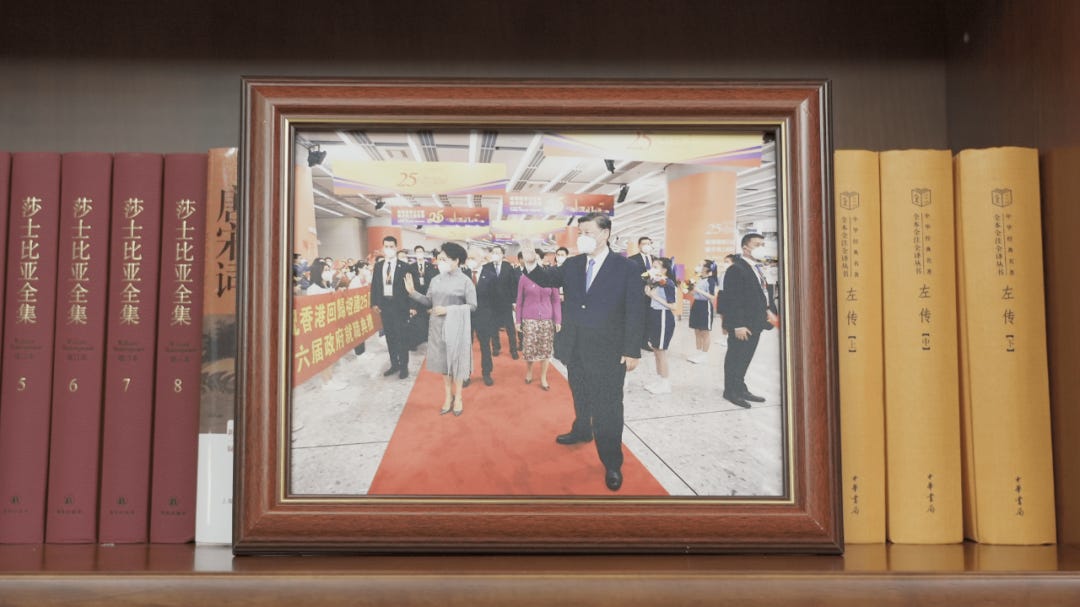
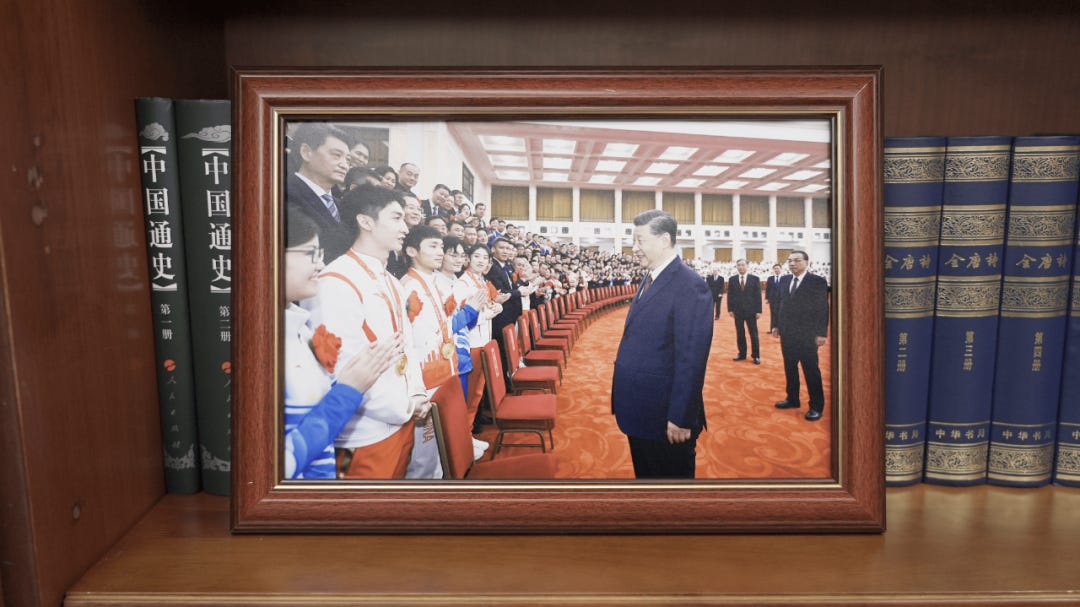
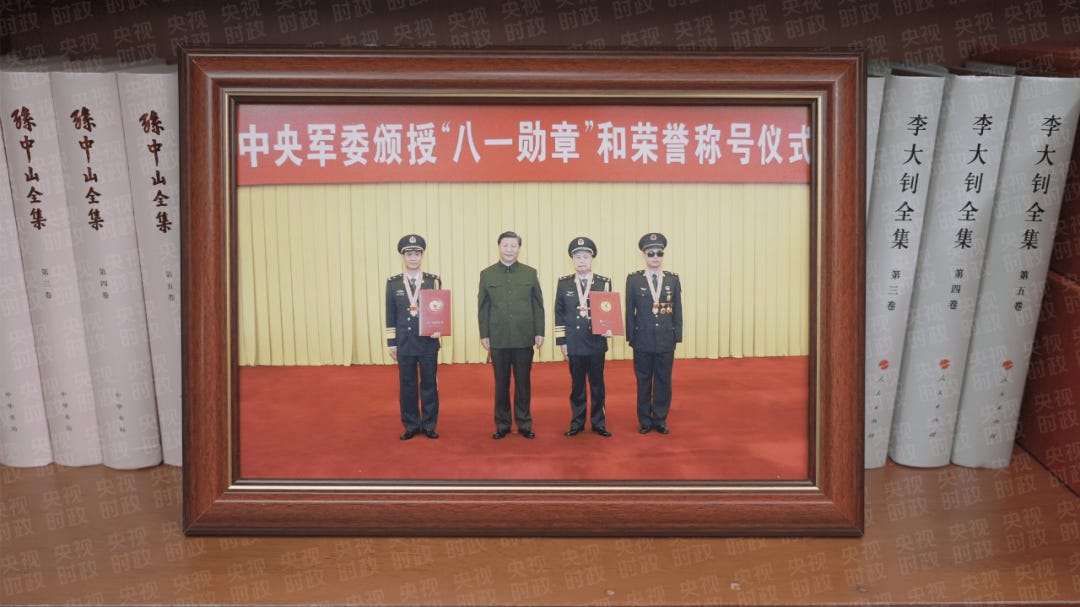
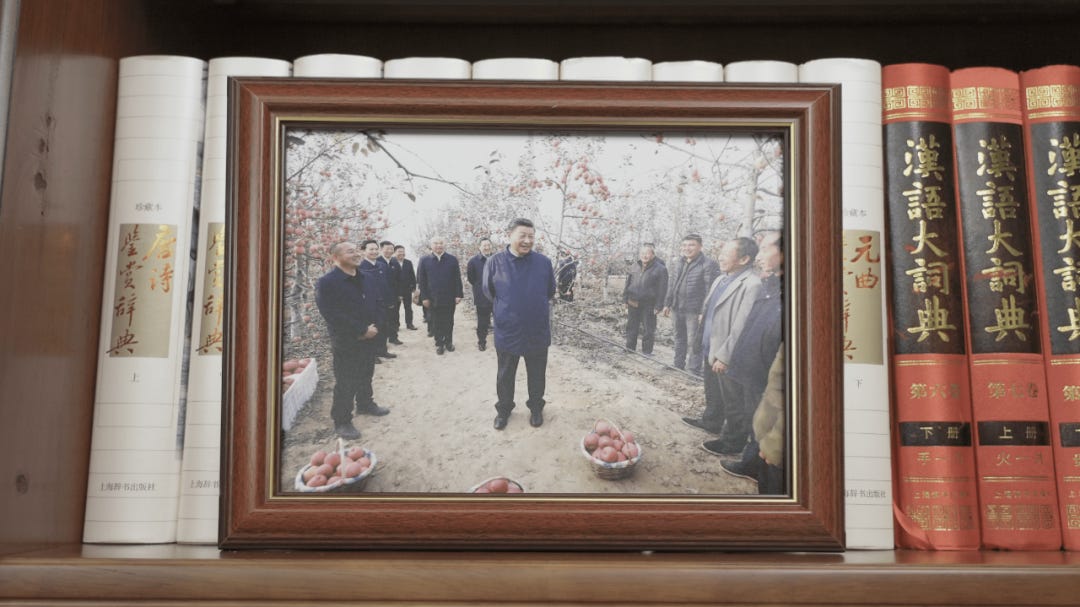
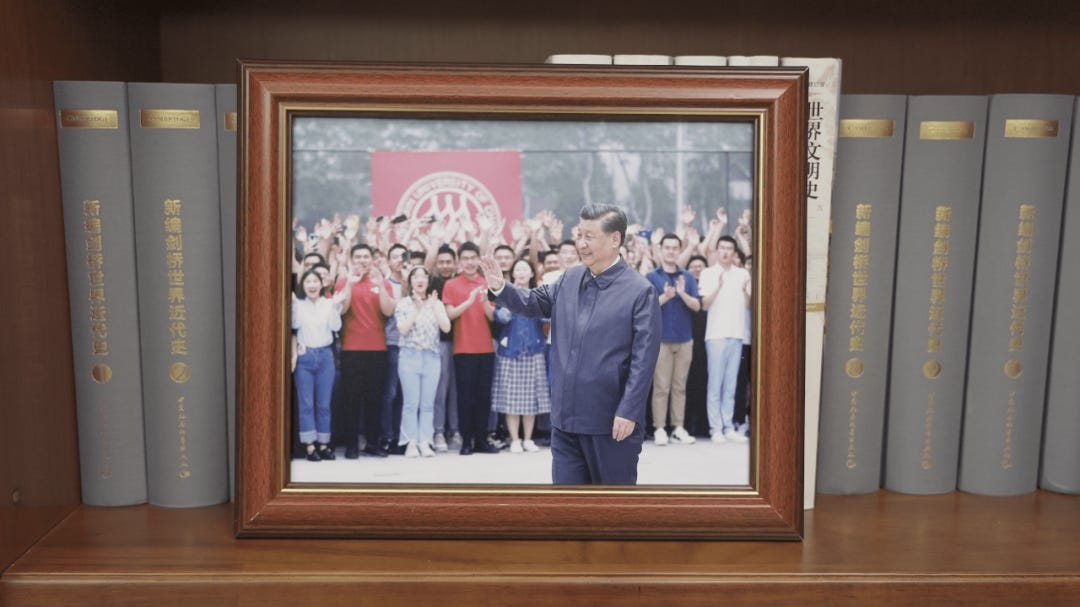

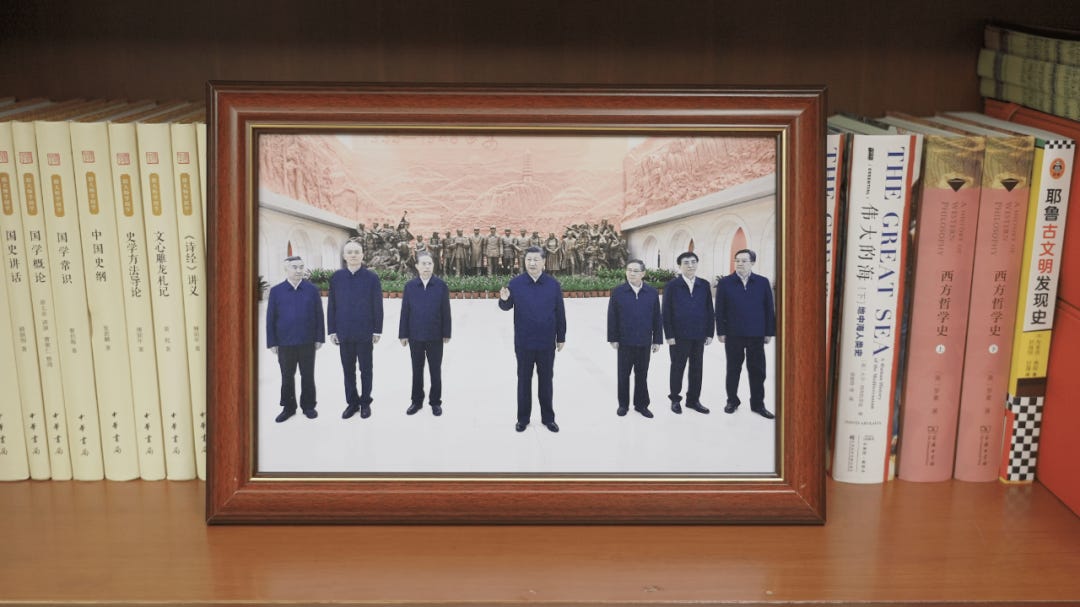
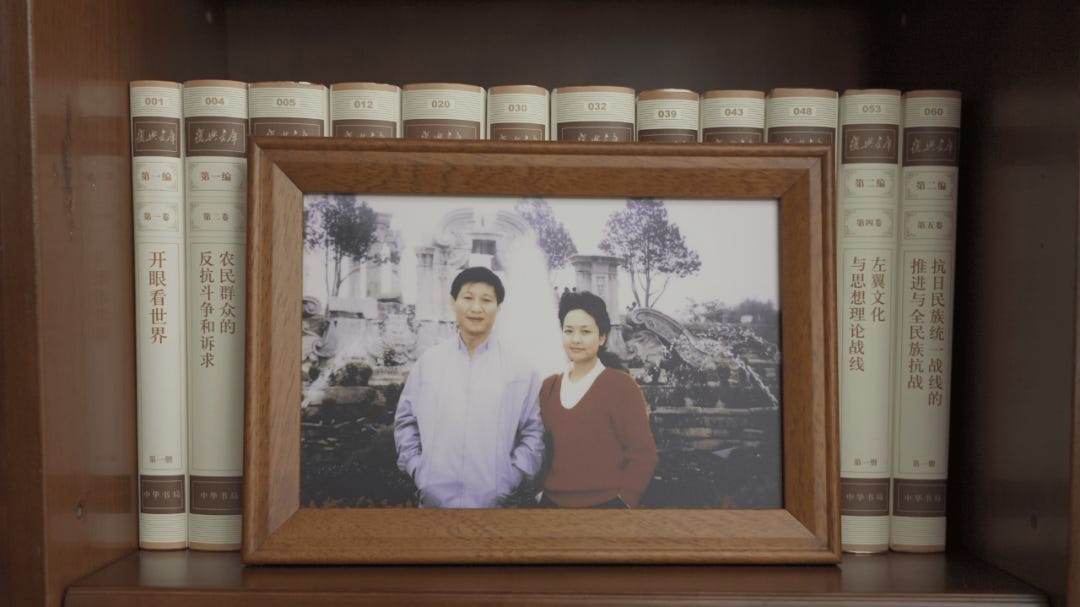
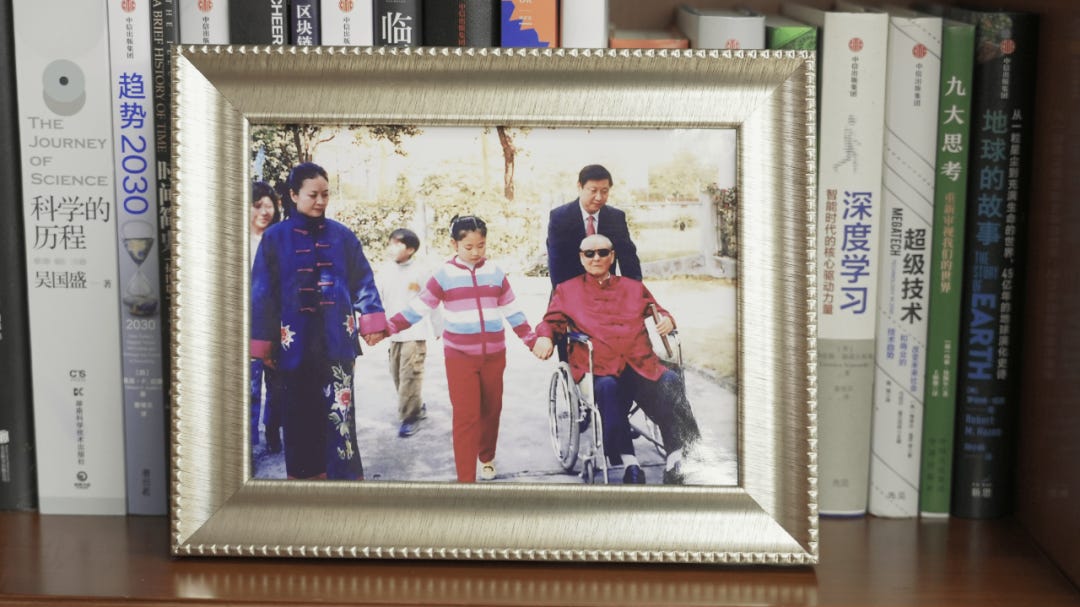
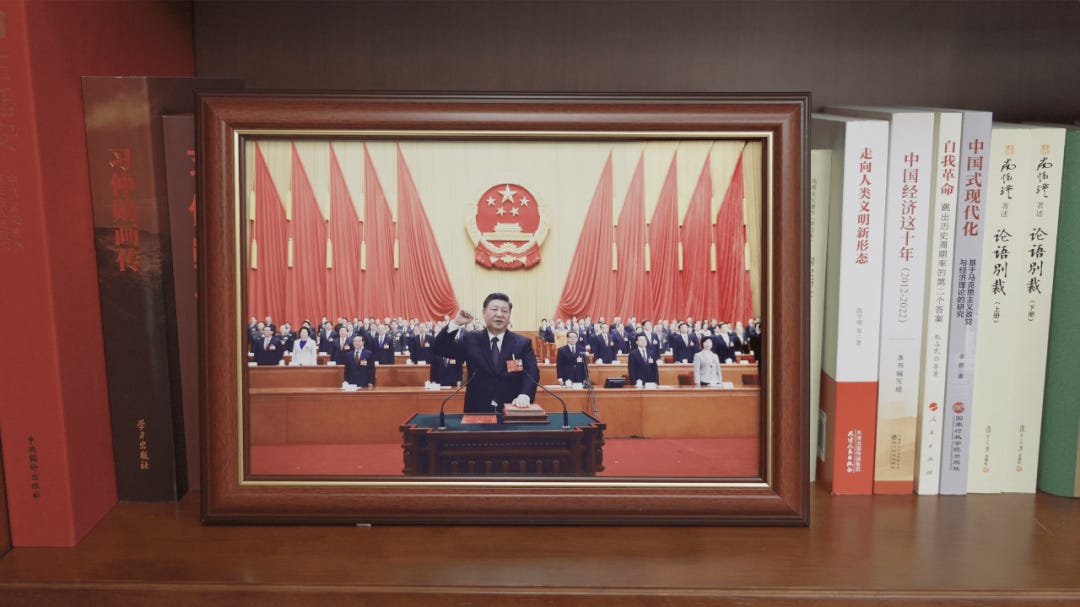

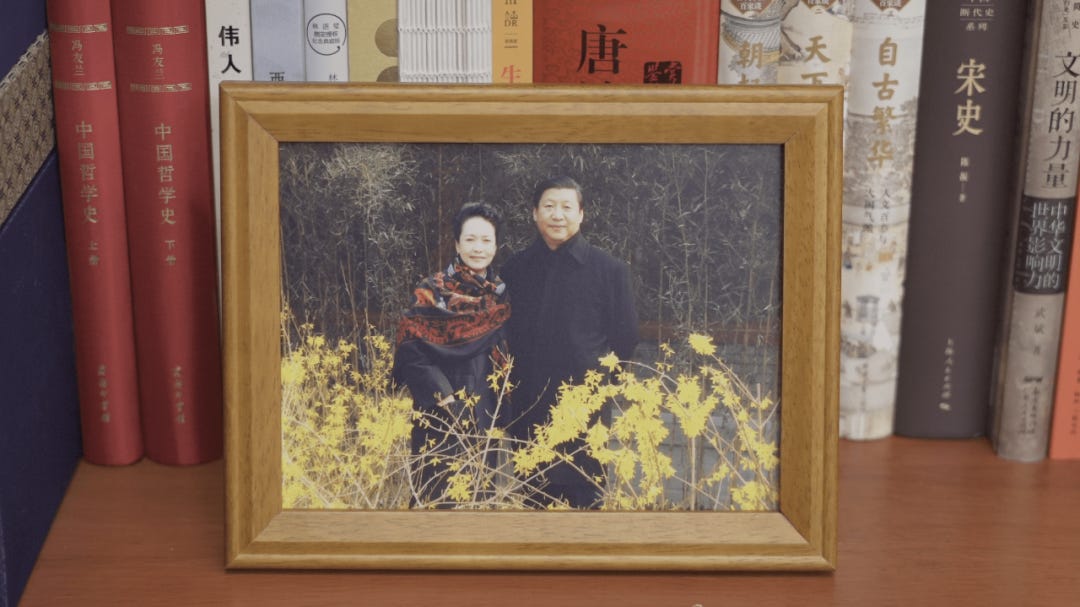
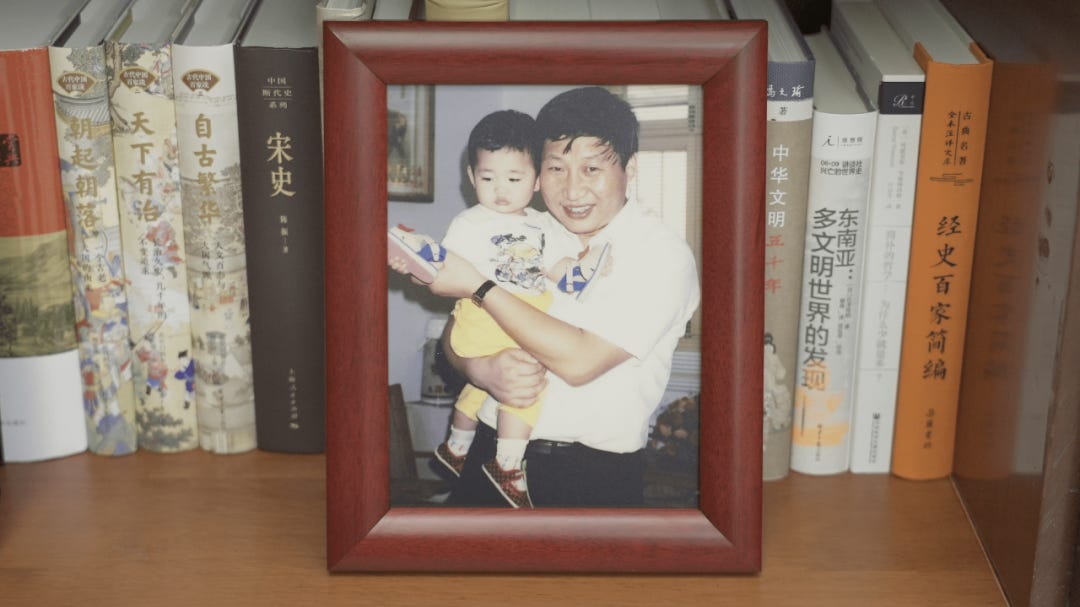
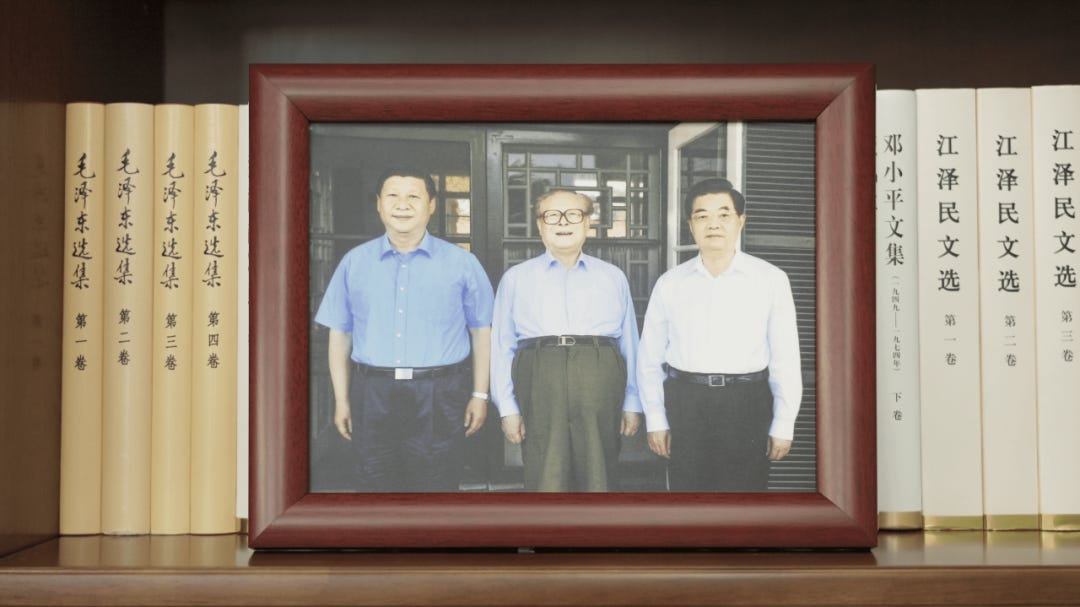
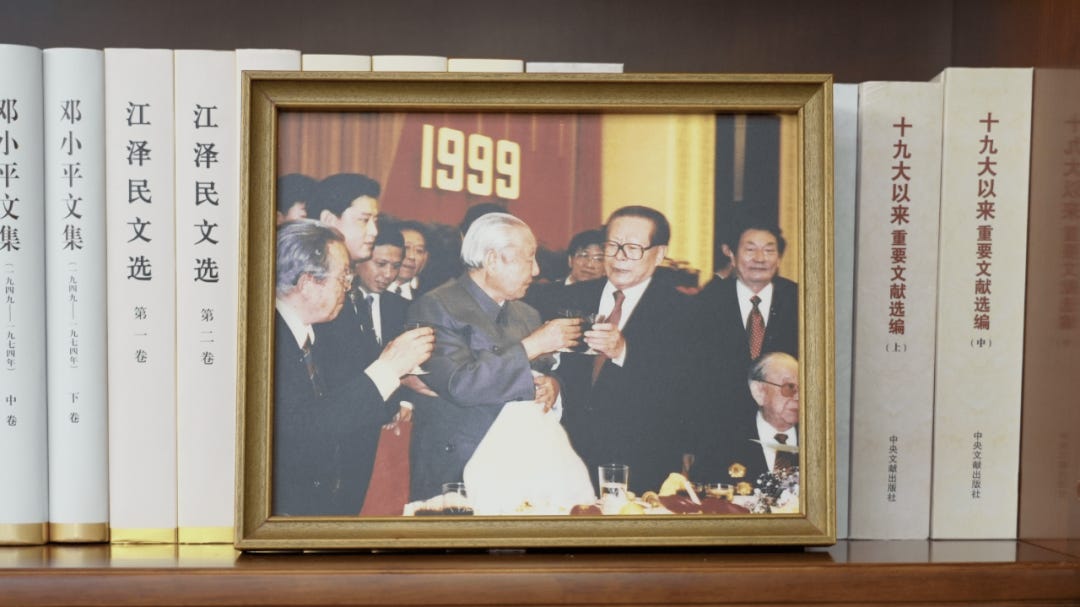
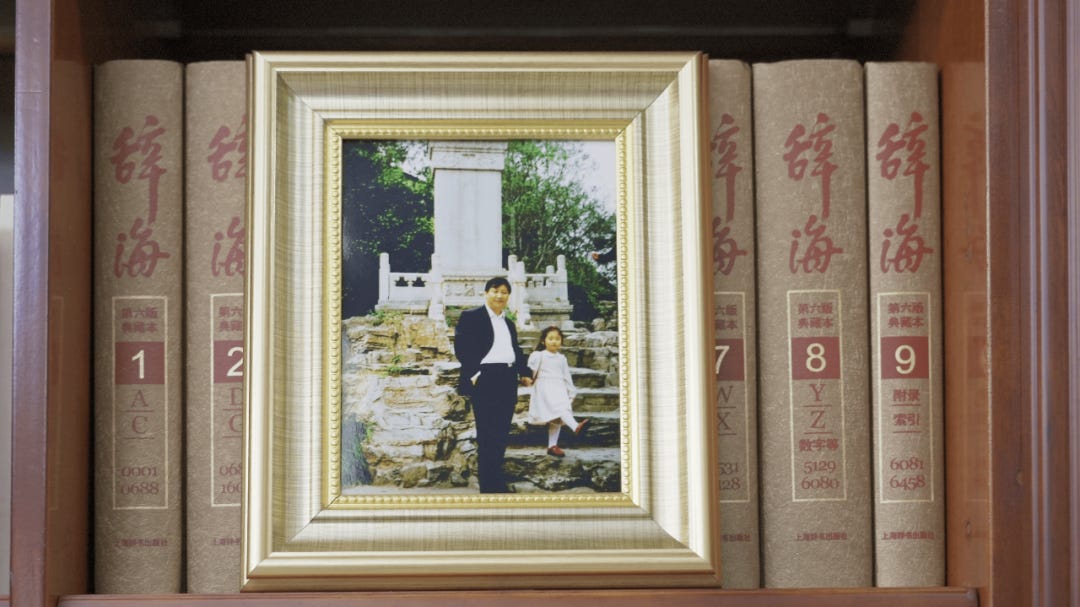
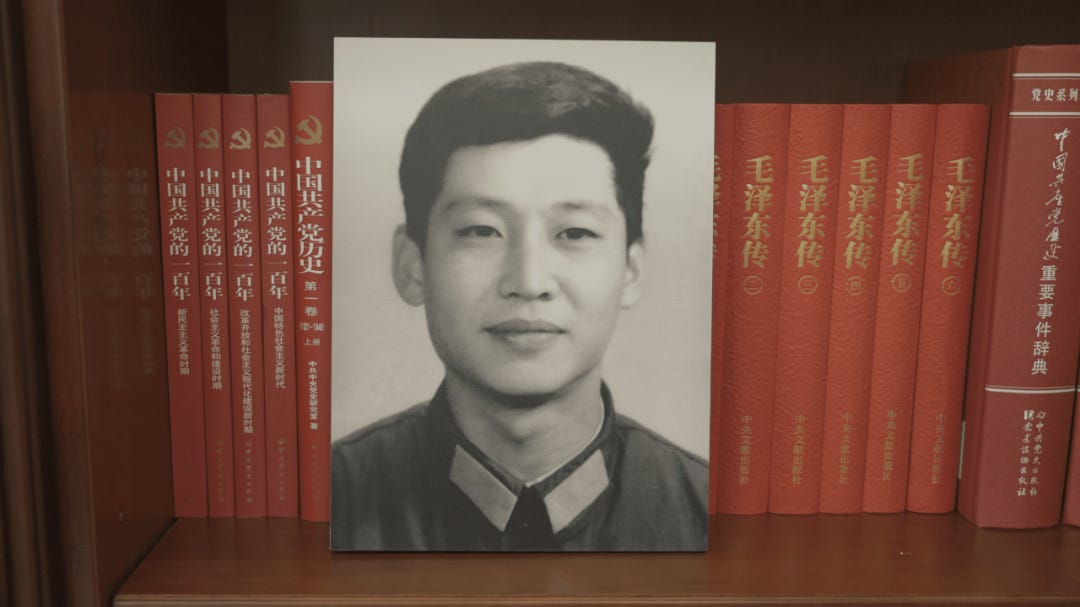
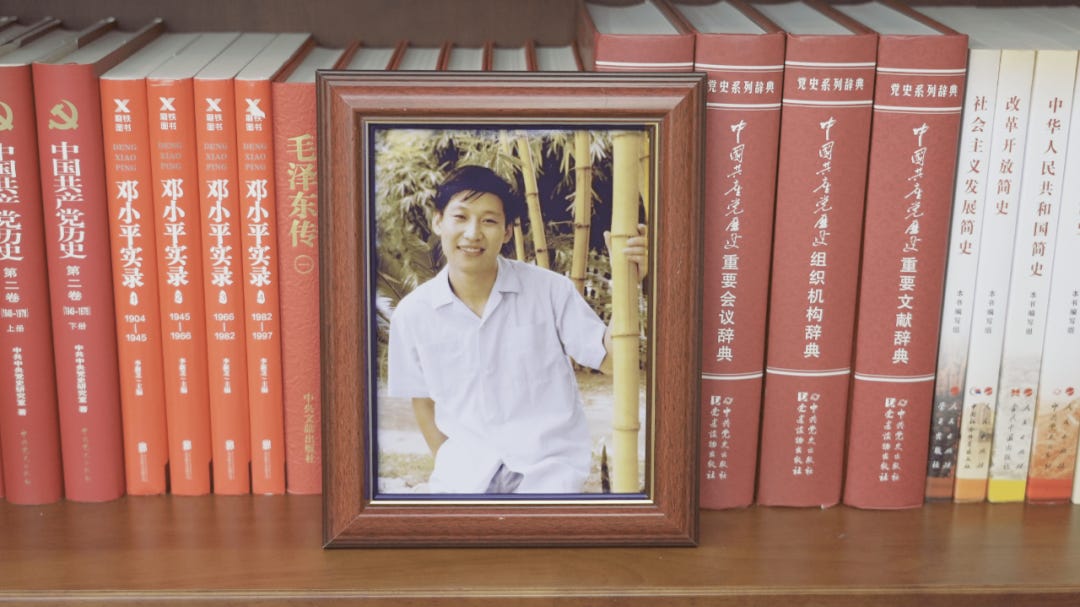

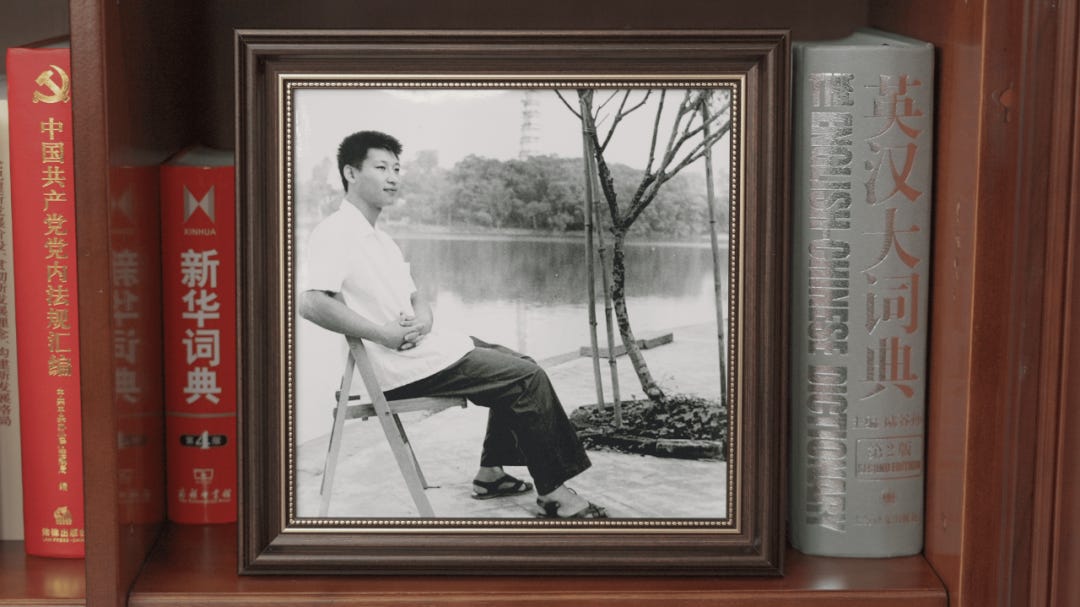
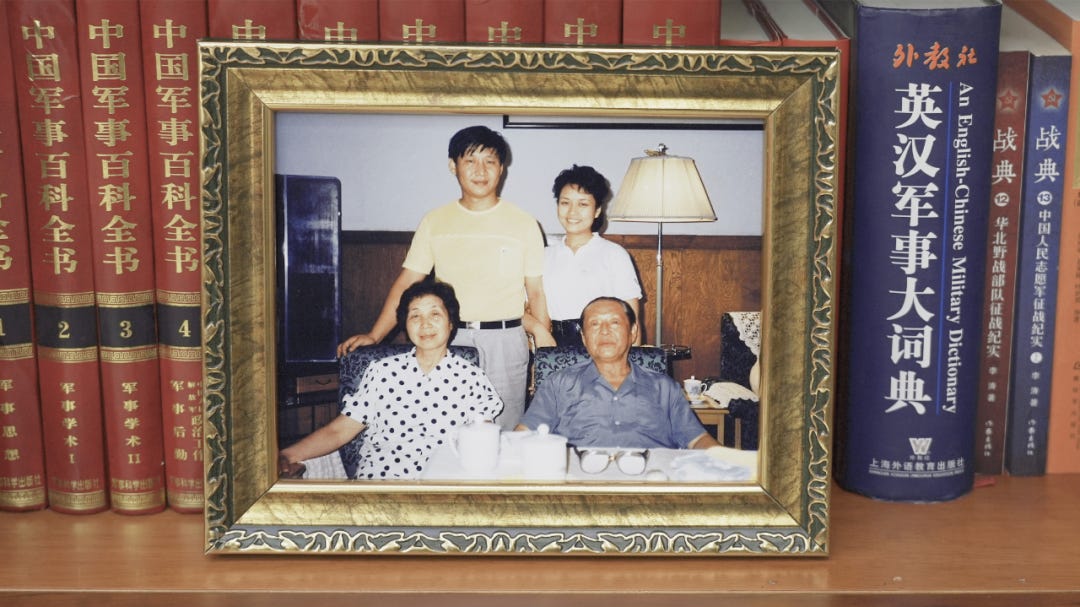
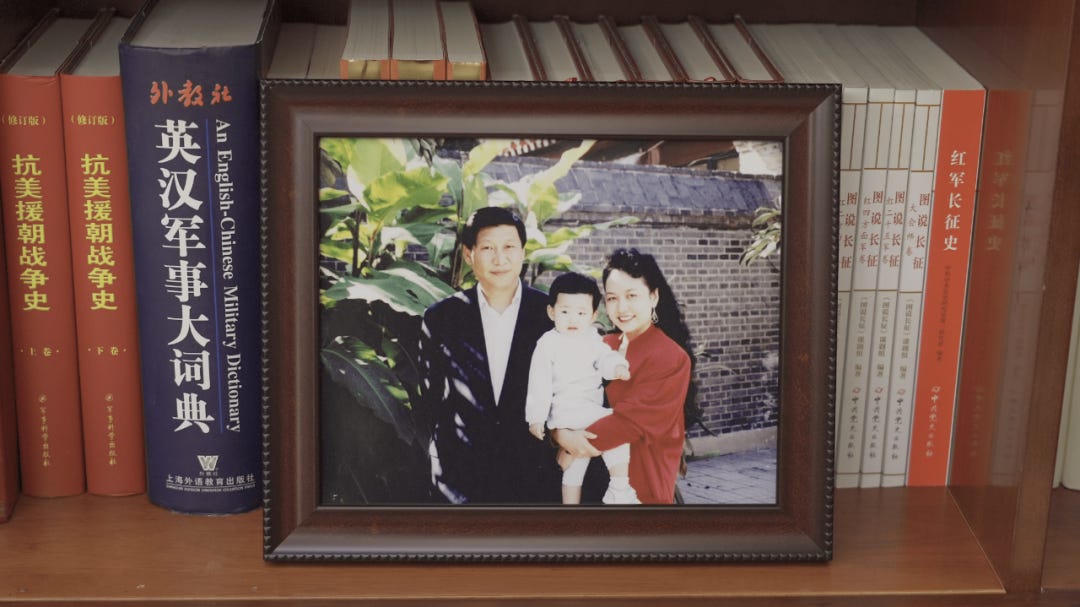
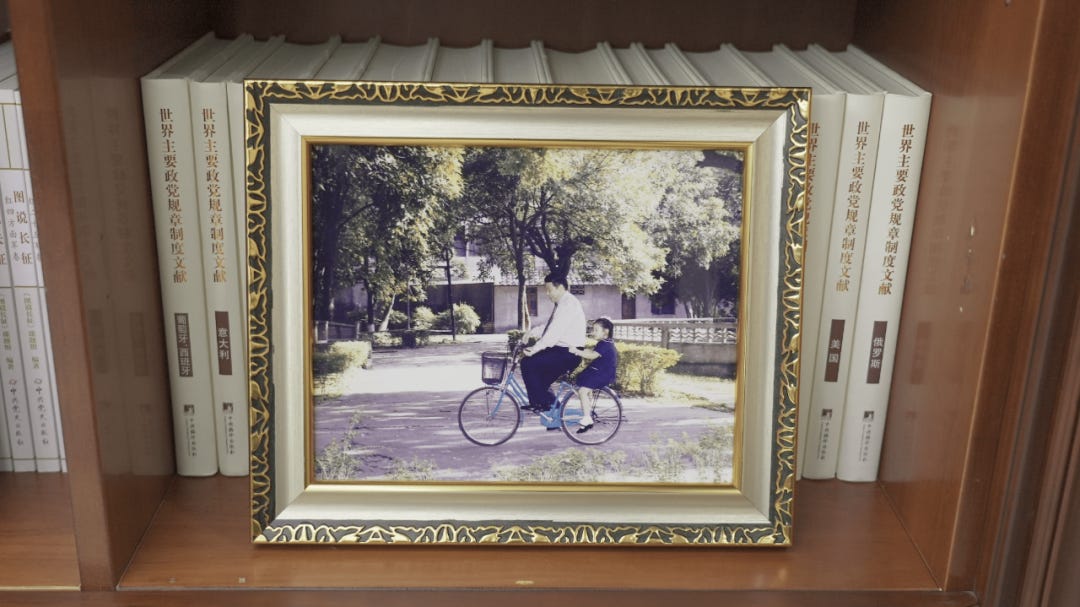
My library doesn't look like this. I don't see a break in the bindings or a crease in the cover in any of these books. They look like they were all unboxed yesterday, and placed to fill each shelf to exact width.
I am left with the question - are these books representative of his reading or are they are they background, crafted by careful professionals that create images for public consumption? Still some interesting choices and some possible future purchases to go on my list.
Great to read the translation and the informative summaries. I think any kind of library and bookshelves are a mirror and representative - no matter if new old, if just made up on the spot which I refuse to consider since it would be too superficial & completly useless (as some in the comments below speculate). Mao was a great reader. His bed was made of books he was surrounded by books and with his insomnia he had ample time to read. There's no compulsion to just show your books if you're already a powerful person and hold the fate of millions. More important would be to offer a more direct, sincere and exemplary look into your readings.
The particular composition or balance offers room for reflection. It's an essential compass and a navigation kit. The role of history, world history, of Chinese history for example is preeminent. Poetry holds a special place. There's a possible Borgesian - infinite phase space of books - yet what gets selected is nearly as important as what gets left out. It's such a treat to have a dive into this.
In our world of blurbs and infobytes, having books and readings books is one o ths greatest (unknown) pleasures.
Seeing a library like this is a privilege (and have an insight into Xi's bibliophile taste). To arrange books and think what books you would like to surround yourself is very important. I have books that hope to read, others I consult from time to time. Others I read and keep reading. Some are just there - just in case something appears on the horizon. They are there in the waiting. Waiting their turn. So books and reading are in a mutual, always changing relation.
A library is both intimate and public, both what's considered important by the book lover and what he considers is important he will be remembered for. There's book companions books that have accompanied you your whole life. In various edition maybe the initial ones lost and destroyed. But they're still there. There's also more general - Bertrand Russell - let's say and also more particular like the book of frugality.
Very interesting to see what kind/what version of Analects (clearly not the typical) stands there. Thank you for sharing.